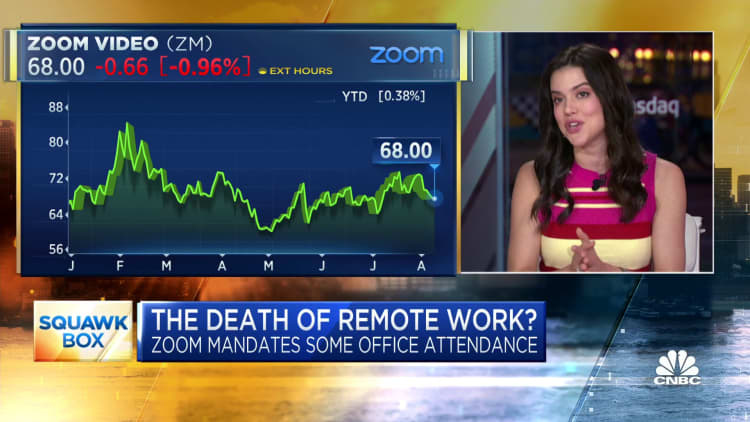WORK
Goh Chiew Tong@CHIEWTONG_G
SHAREShare Article via FacebookShare Article via TwitterShare Article via LinkedInShare Article via Email

The symptoms of performative work include “spending a lot of time in meetings where “teams present achievements” rather than making decisions or addressing issues,” said Derek Laney, Slack’s technology evangelist for Asia Pacific.
Patrick Chu | E+ | Getty Images
Workers in Asia are spending the most time on “performative work” — in other words, focusing on appearing busy more than doing real, productive work.
That’s according to a new global survey from Salesforce subsidiary Slack and research firm Qualtrics, which pulled data from more than 18,000 desk workers, including executives.
Performative work includes “spending a lot of time in meetings where ‘teams present achievements’ rather than making decisions or addressing issues,” said Derek Laney, Slack’s “technology evangelist” for Asia-Pacific.
ADVERTISING

11:07
Four-day workweek: Are we heading there?
The survey found that employees from India (43%), Japan (37%) and Singapore (36%) reported spending more of their time on such work than the global average (32%).
Global ranking for percentage of time spent on “performative work”:
Japan (63%), Singapore (63%) and India (57%) were ranked lowest for percentage of time spent on productive or “real work,” Slack said.
“This disconnect leads to wasted effort where employees try to show up well in front of their leaders.”
Globally, visibility and activity metrics, such as the number of hours spent online or the number of emails sent, are ranked as the top way (27%) leaders measure productivity, according to the report.
Employees may in turn feel pressured to work longer hours, respond to emails immediately, or sit in on every meeting, it added.
For example, 44% of Singapore employees — the highest globally — say their productivity has been affected by spending “too much time” in meetings and emails.
Slack found that 63% of survey respondents make an effort to keep their status active online, even if they’re not working.
Global ranking for percentage of time spent on “real work”:

10:35
Watching YouTube at work? Your manager may know
Instead of activity metrics, workers surveyed want to be assessed most through key performance indicators; conversations with their managers; and the “hours spent on specific types of work.”
“There is an opportunity for companies to explore new and different ways of working, such as … adopting asynchronous ways of working rather than meetings, to facilitate more effective collaboration at work,” Laney said.
The report highlighted that more than half of respondents said the best way for employers to support productivity is through flexible schedules, with 36% opting for flexible locations.
Unique workplace benefits and office improvements rank lower at 32%.
The survey found that when it comes to returning to the office, workers consider having “a sense of community” and brainstorming as a team “more productive” than engaging in tasks that can be done at home.

6:26
The Death of Remote Work? Zoom orders workers to return to office at least twice a week
Microsoft’s latest research echoed that sentiment — 84% of global employees said they would be motivated to go to the office if they could socialize with their colleagues, which they valued more than a better work set-up.
“Flexibility is so much more than location, it’s also how and when we work. That means … being intentional over which environments are best for specific tasks,” the report said.
“What matters above all is that work schedules and locations are purposeful according to the kind of work being done — and that each team’s agreements are well-defined.”
Employees in Asia are spending the most time looking busy at work, says Slack report
Published Sun, Aug 13 20238:14 PM EDTGoh Chiew Tong@CHIEWTONG_G
SHAREShare Article via FacebookShare Article via TwitterShare Article via LinkedInShare Article via Email

The symptoms of performative work include “spending a lot of time in meetings where “teams present achievements” rather than making decisions or addressing issues,” said Derek Laney, Slack’s technology evangelist for Asia Pacific.
Patrick Chu | E+ | Getty Images
Workers in Asia are spending the most time on “performative work” — in other words, focusing on appearing busy more than doing real, productive work.
That’s according to a new global survey from Salesforce subsidiary Slack and research firm Qualtrics, which pulled data from more than 18,000 desk workers, including executives.
Performative work includes “spending a lot of time in meetings where ‘teams present achievements’ rather than making decisions or addressing issues,” said Derek Laney, Slack’s “technology evangelist” for Asia-Pacific.
ADVERTISING

11:07
Four-day workweek: Are we heading there?
The survey found that employees from India (43%), Japan (37%) and Singapore (36%) reported spending more of their time on such work than the global average (32%).
Global ranking for percentage of time spent on “performative work”:
- India: 43%
- Japan: 37%
- Singapore: 36%
- France: 31%
- United Kingdom: 30%
- Australia: 29%
- Germany: 29%
- TIE — United States: 28%
- TIE — South Korea: 28%
Japan (63%), Singapore (63%) and India (57%) were ranked lowest for percentage of time spent on productive or “real work,” Slack said.
‘Wasted effort’
According to Laney, employees’ focus on appearing busy is “likely influenced” by the way leaders are measuring productivity.“Leaders are most likely to judge productivity based on visible activity instead of focusing on achieving outcomes,” Laney said.Leaders are most likely to judge productivity based on visible activity instead of focusing on achieving outcomes.
Derek Laney
TECHNOLOGY EVANGELIST FOR ASIA-PACIFIC, SLACK
“This disconnect leads to wasted effort where employees try to show up well in front of their leaders.”
Globally, visibility and activity metrics, such as the number of hours spent online or the number of emails sent, are ranked as the top way (27%) leaders measure productivity, according to the report.
Employees may in turn feel pressured to work longer hours, respond to emails immediately, or sit in on every meeting, it added.
For example, 44% of Singapore employees — the highest globally — say their productivity has been affected by spending “too much time” in meetings and emails.
Slack found that 63% of survey respondents make an effort to keep their status active online, even if they’re not working.
Global ranking for percentage of time spent on “real work”:
- South Korea: 72%
- TIE — Australia: 71%
- TIE — Germany: 71%
- TIE — United States: 71%
- United Kingdom: 70%
- France: 69%
- TIE — Japan: 63%
- TIE — Singapore: 63%
- India: 57%

10:35
Watching YouTube at work? Your manager may know
Instead of activity metrics, workers surveyed want to be assessed most through key performance indicators; conversations with their managers; and the “hours spent on specific types of work.”
“There is an opportunity for companies to explore new and different ways of working, such as … adopting asynchronous ways of working rather than meetings, to facilitate more effective collaboration at work,” Laney said.
Employees prefer asynchronous work
Workers are still very much in favor of asynchronous work, which was prevalent during the pandemic in light of remote working arrangements. Asynchronous work means tasks are not carried out in real-time and in person.The report highlighted that more than half of respondents said the best way for employers to support productivity is through flexible schedules, with 36% opting for flexible locations.
Unique workplace benefits and office improvements rank lower at 32%.
The survey found that when it comes to returning to the office, workers consider having “a sense of community” and brainstorming as a team “more productive” than engaging in tasks that can be done at home.

6:26
The Death of Remote Work? Zoom orders workers to return to office at least twice a week
Microsoft’s latest research echoed that sentiment — 84% of global employees said they would be motivated to go to the office if they could socialize with their colleagues, which they valued more than a better work set-up.
“Flexibility is so much more than location, it’s also how and when we work. That means … being intentional over which environments are best for specific tasks,” the report said.
“What matters above all is that work schedules and locations are purposeful according to the kind of work being done — and that each team’s agreements are well-defined.”



